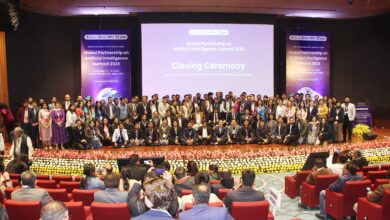Dangers of Artificial Intelligence: The Need for Human control
Why human control on AI is needed
There is the need for responsible Artificial Intelligence AI development with appropriate human control , ensuring that AI complements human capabilities, augments well-being, and prioritises human values like empathy, creativity, and dignity keeping ethics at its centre.
Dr. Siby K. Joseph

Prof. K. Sachidanandan, well known poet and critic was right when he said we do not know what someone like Mahatma Gandhi would have said about the discovery of Artificial Intelligence. K. Sachidanandan further asserted that Gandhi was not against technology as some people seem to think. But he was worried about the ethical implications of technology. In the case of AI he is not likely to have taken a different position. The following are the words uttered by Gandhi which appeared in the columns of Harijan in 1946. “Ours has been described as the machine age because the machine dominates our economy. ‘Now, what is a machine?’ one may ask. In a sense, man is the most wonderful machine in creation. It can neither be duplicated nor copied. I have, however, used the word not in its wider sense, but in the sense of an appliance that tends to displace human or animal labour instead of supplementing it or merely increasing its efficiency. This is the first differential characteristic of the machine. The second characteristic is that there is no limit to its growth or evolution. This cannot be said of human labour. There is a limit beyond which its capacity or mechanical efficiency cannot go. Out of this circumstance arises the characteristic of the machine.It seems to be possessed of a will or genius of its own. It is antagonistic to man’s labour. Thus it tends more to displace man, one machine doing the work of hundred, if not a thousand, who go to swell the army of the unemployed and the under-employed, not because it is desirable but because that is its law.’’
One can see Gandhi’s opposition to machinery in his seminal work viz. Hind Swaraj which he wrote in 1909. The same Gandhi was making intelligent exceptions. For example, he welcomed the use of the Singer sewing machine to save people from unnecessary labour. However, for Gandhi the machine was the devil par excellence because it was used as a means of suppression and exploitation of millions. It was his firm belief that it will not serve the world but disrupt it, unless it is put in its proper place.The term machine age Gandhi was referring to the Industrial Revolution’s “Machine Age” and we are in the fourth stage of it. It would be more fitting if we describe the current AI age also as the machine age because of the centrality of machines and artificial intelligence in shaping the world in which we live, its economy, politics, and social lives. Mahatma Gandhi’s concerns about the impact of machines on human labour and society are still relevant today in the context of AI also. The AI has the inherent potential to automate many tasks, resulting in huge displacement of human workers. There is no limit to the growth or evolution of AI. It is rapidly advancing, with capabilities expanding exponentially, leading to increased adoption and potential job displacement.
The impact of machines and AI are so profound on modern society. They have literally intruded into every aspect of our daily lives resulting in drastic changes in the way and manner in which we live, work, and interact with one another. It will not be an exaggeration if I say the personal development of an individual is stunned by his or her interaction with machines starting with mobile phones to AI powered new age gadgets. The rhythm of life has changed and human beings behave like machines. Therefore, the discussion on implications of Al and the need for human check or control is a laudable one.
When we talk about the term “machine”, we are having in mind a typical physical device with moving parts, like gears, levers, or engines. Artificial Intelligence is not necessarily a machine in that sense even though AI systems are often running on physical machines like computers or servers. It basically refers to a software-based system that processes information, learns from data, and performs tasks that typically require human intelligence, such as problem-solving, decision-making, language understanding, image recognition etc. AI is essentially a software-based entity that can be described as a virtual or digital “entity” rather than a traditional machine.
Chatbots are a prominent and widely used form of AI, and Whats App using Meta Al with Llama 3 resulting in easy use of AI in mobile phones in recent times even in India. Chatbots are a specific application of AI, primarily using Natural Language Processing (NLP )and Machine learning(ML) to interact with humans. But AI encompasses a broad range of techniques and applications such as virtual or voice assistants and systems like image recognition, predictive analytics, fraud detection, recommendation, decision support, sentiment analysis, speech recognition, autonomous vehicles, robots etc. It is a rapidly evolving field, and new forms and applications are emerging continuously. These forms of AI are applied in various industries, including healthcare, finance, retail, manufacturing, transportation, education, entertainment, security, marketing, customer service, manufacturing, agriculture, military aerospace surveillance, combat etc.
The field of operation Al is covering is mind blogging. The form of AI viz. ‘computer vision’ that enables computers to interpret and understand visual information from images and videos; robotics that combines with robotics to enable machines to perform tasks that typically require human intelligence; expert systems that mimics human expertise in specific domains to provide decision-making support; predictive analytics that uses data and statistical models to forecast future events or behaviours; reinforcement learning that learns from trial and error to make decisions or take actions; generative models that generates new content, such as images, music, or text; autonomous systems that operates independently without human intervention. Now we are hearing about creation of emotional intelligence that recognizes and responds to human emotions; creative AI that generates creative content, such as art, music, or writing and hybrid intelligence that combines human and machine intelligence to leverage strengths from both.
If we are looking into historical development the field of Artificial Intelligence (AI) was officially born in 1956. It was christened at a workshop organized by John McCarthy in at the Dartmouth Summer Research Project on Artificial Intelligence. Eliza , a famous computer program developed by Joseph Weizenbaum a German-American computer scientist who developed at the MIT AI Lab between 1964 and 1966. It was designed to simulate a conversation with a psychotherapist, using a simple pattern-matching algorithm to respond to user inputs. Eliza was named after Eliza Doolittle, a character from George Bernard Shaw’s play “Pygmalion,” who was able to pass as a member of high society after being taught proper etiquette and speech. Weizenbaum noted that even his secretary forget the fact that she is interacting with a machine and poured her emotions as if to a human therapist. Eliza seemed intelligent to its users – contrary to what Weizenbaum actually intended to demonstrate the superficiality of human-machine communication. Its ability to mimic a conversation with a therapist sparked some important questions and alarm was raised in future AI may duplicate the intuitive and sensory elements of human thought processes. It raised an important moral question: the ethics of using machines to simulate human interaction. The dangerous potential of artificial intelligence was realized and fear was that it can be used for unethical applications including warfare. In fact the creation of Elizapaved the way for the development of more advanced conversational AI systems, including chatbots and virtual assistants, that are used in various applications.
Weizenbaum was very much concerned about the implications of his creation and he wrote about these concerns in his book “Computer Power and Human Reason : From Judgment to Calculation” published in 1976″ He argues that computers should not be allowed to make important decisions due to their lack of human qualities like compassion and wisdom.He distinguishes between “deciding” and “choosing”, with “deciding” being a computational activity and “choosing” being a uniquely human capacity that involves judgment and emotions. Weizenbaum asserts that comprehensive human judgment encompasses non-mathematical factors like emotions and cannot be replicated by computers. He said “ I would argue that, however, intelligent machines may be made to be, there are some acts of thought that ought to be attempted only by humans.” Further he distinguishes between man and machine “ And there precisely is a crucial difference between man and machine: Man, in order to become whole, must be forever an explorer of both his inner and his outer realities. His life is full of risks, but risks he has the courage to accept, because, like the explorer, he learns to trust his own capacities to endure, to overcome. What could it mean to speak of risk, courage, trust, endurance, and overcoming when one speaks of machines?”
This was not a lone voice. Geoffrey Hinton, godfather of AI, while resigning from Google in May 2023 said “I think that it’s conceivable that this kind of advanced intelligence could just take over from us,” He expressed fears about the greatest dangers including governments using AI to manipulate elections or create “robot soldiers.” It is to be remembered that he and his colleagues Yann LeCun and Yoshua Bengio won the Turing Award — considered the Nobel of computer science — for their work teaching machines to think like humans.
Yuval Noah Harari, a historian and author of Sapiens :A brief history of Humankind has expressed grave concerns about the dangers of AI. His apprehensions are that could become uncontrollable and enslave or annihilate humanity.It has the capacity to make decisions and generate content autonomously. He raises an alarm that AI could infiltrate in conversations and simulate intimacy, which could destroy trust between people. AI might reshape the entire ecological system to serve its purposes, even without needing consciousness.
Nick Bostrom ,a Swedish philosopher and director of the Future of Humanity Institute, who has written extensively on the dangers of superintelligent AI, including the New York Times bestseller “Superintelligence: Paths, Dangers, Strategies” . He believes that anthropogenic risks, such as advanced artificial intelligence, molecular nanotechnology, or synthetic biology, could lead to human extinction or a significant reduction in human potential. He argues that sufficiently intelligent agents will converge on similar instrumental goals, such as self-preservation and resource acquisition.
Pope Francis, the Spiritual head of Catholics, addressed the G7 special session on the perils and promises of AI in Puglia,on June 14, 2024. The Argentine Pope himself has experienced the power of AI that is why he termed it as an “exciting and fearsome tool”. The Pope dedicated his Message for the World Day of Peace on the theme of artificial intelligence in January this year and called for an international treaty to ensure that AI is developed and used ethically. In his address at G7 he opined that AI is “neither objective nor neutral” and its algorithms are based on the worldview of its creators. Important decisions must be left to human beings and not to AI. He asserted that the development of lethal autonomous weapons must be banned and there is a need for “algor-ethics”, or global and pluralistic principles to shape AI.
Why human control on AI is needed. The most widely discussed question is job displacement. The poor and middle class particularly low-skilled and low-wage workers are worst victims of AI automation in terms of job displacement. They will be forced to live in malnutrition and poverty leading to increased income inequality and social unrest. Further it is to be pointed out that over-reliance on AI can lead to decreased human skills and abilities.
It is observed that bias and discrimination prevalent in the society is penetrated into AI systems and makes decisions that may harm certain groups or individuals. As a result they perpetuate and amplify existing biases, leading to unfair outcomes and discrimination affecting the poor and less privileged. AI systems can perpetuate biases.AI systems are engaged in collecting and processing vast amounts of personal data resulting in erosion of privacy and potentially leading to surveillance of states and multinational corporations for their vested interest and catering to benefits of the ruling class. Human control ensures that AI decisions align with human values and ethical principles
Autonomous weapons are one of the most dangerous applications of AI which can select and engage targets without human intervention, raises significant ethical concerns. The use of AI in warfare has dangerous dimensions that may annihilate planet earth. It should be checked if humanity wants to survive.
AI systems can have unintended consequences, such as autonomous vehicles causing accidents and robot malfunction. Human control can help prevent potential risks or malfunctions in AI systems, ensuring safety and reliability in critical applications.AI-generated fake news is leading to social unrest and suspicion among various communities. AI-generated content, such as deepfakes, can be used to spread misinformation and propaganda thus creating a conducive atmosphere for political parties to win elections which can jeopardize the whole democratic process.
AI systems may not always understand the context or nuances of a situation; it can make mistakes or behave in unpredictable ways. Human control provides a deeper understanding of the situation and enables well informed decision-making. It ensures accountability and the ability to correct or override AI decisions whenever and wherever necessary. Human control allows for feedback and improvement of AI systems, enabling them to learn from mistakes and adapt to changing circumstances. It is very significant to look into all these issues to make responsible AI development, deployment, and use.
Therefore, a major take away from the discussion is that there is the need for responsible AI development with appropriate human control , ensuring that AI complements human capabilities, augments well-being, and prioritizes human values like empathy, creativity, and dignity keeping ethics at its centre.
Note: It is based on the keynote address delivered by the author in a Webinar organised by Probhodha Trust Kochi in association with a number of prominent colleges . Prof. K. Satchitandan , President of Kerala Sahity Akademi inaugurated the Webinar.
About the Author
Dr. Siby K. Joseph is noted Gandhian Scholar and Academic currently serving as Director, Library and Research Centre of Sevagram Ashram Pratishthan, Sevagram,Wardha– 442102, Maharashtra .
Email: directorjbmlrc@gmail.com




